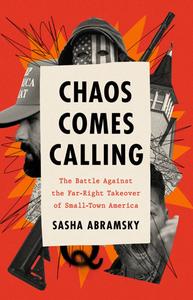
 Though most Americans who follow politics are transfixed by the daily swirl of events in Washington, D.C., their everyday lives are often more directly affected by controversies closer to home. That's what makes journalist Sasha Abramsky's Chaos Comes Calling such an important and disturbing book. In this fine-grained account of political and social turmoil in two small communities riven by disputes over the Covid-19 pandemic, George Floyd's murder in May 2020, and the 2020 presidential election, he illustrates how the intense conflict in these outwardly placid places is a microcosm of the polarization in the nation at large and illustrative of the difficulty of transcending it.
Though most Americans who follow politics are transfixed by the daily swirl of events in Washington, D.C., their everyday lives are often more directly affected by controversies closer to home. That's what makes journalist Sasha Abramsky's Chaos Comes Calling such an important and disturbing book. In this fine-grained account of political and social turmoil in two small communities riven by disputes over the Covid-19 pandemic, George Floyd's murder in May 2020, and the 2020 presidential election, he illustrates how the intense conflict in these outwardly placid places is a microcosm of the polarization in the nation at large and illustrative of the difficulty of transcending it.
Abramsky (The House of Twenty Thousand Books) focuses his attention on Sequim, Wash., a town of about 8,000 residents on the state's Olympic Peninsula, and largely rural and small-town Shasta County, in Northern California. After the onset of Covid-19 in March 2020, in both locales, discontent over lockdowns and the imposition of mask and vaccination mandates quickly sparked resistance that mushroomed into pervasive and often violent threats against public health officers and elected officials struggling to contain the pandemic.
A similar cycle ensued when nationwide protests erupted after George Floyd's murder and after Donald Trump began spreading his false claims about rigged voting machines and voter fraud that he insisted cost him the 2020 election. Baseless rumors quickly spread that Antifa-inspired mobs soon would be invading these quiet communities. In Shasta County, county supervisors with impeccable conservative credentials found themselves neutralized by newly elected QAnon true believers and, in one case, removed from the board in a recall election spearheaded by local militia members. In an especially terrifying scene, Abramsky describes how Doni Chamberlain, a "diminutive grandmother" and former print journalist who persistently criticized these far-right elements in an online publication, was physically assaulted when she attempted to cover one right-wing gathering.
Abramsky's sympathies clearly lie with local residents opposing the excesses of hard-right extremism, but he relies on interviews with participants and observers from all perspectives to describe with commendable objectivity what he calls this "stranger-than-strange political moment." He examines, for example, how dangerous rumors initiated on and spread by social media provide both the tinder and the match for potentially explosive confrontations, and reveals the challenges facing those who attempt to restore a measure of sanity to the political process. While the 2024 presidential contest will draw most of the attention as the race intensifies, he makes clear that, long after it's over, some of the fiercest and most consequential battles to determine the future of American democracy will be fought in our own backyards. --Harvey Freedenberg, freelance reviewer
Shelf Talker: Journalist Sasha Abramsky takes a close look at the rise of right-wing extremism in two small West Coast communities and the challenge of opposing it.

